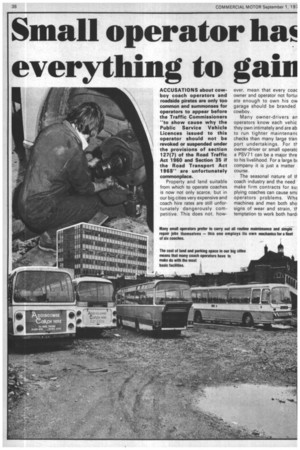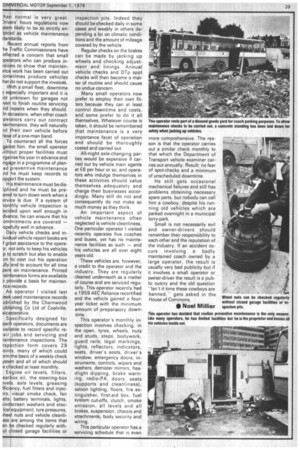Small operator hal everything to gab
Page 40

Page 41

If you've noticed an error in this article please click here to report it so we can fix it.
ACCUSATIONS about cowboy coach operators and roadside pirates are only too common and summonses for operators to appear before the Traffic Commissioners "to show cause why the Public Service Vehicle Licences issued to this operator should not be revoked or suspended under the provisions of section 127(7) of the Road Traffic Act 1960 and Section 35 if the Road Transport Act 1968" are unfortunately commonplace.
Property and land suitable from which to operate coaches is now not only scarce, but in our big cities very expensive and coach hire rates are still unfortunately dangerously competitive. This does not, how
ever, mean that every coac owner and operator not fortul ate enough to own his ow garage should be branded cowboy.
Many owner-drivers an operators know each vehic they own intimately and are ab to run tighter rnaintenanc checks than many large Iran port undertakings, For th owner-driver or small operatc a PSV71 can be a major thre to his livelihood. For a large lot company it is just a matter course.
The seasonal nature of if coach industry and the need make firm contracts for sul plying coaches can cause srm operators problems. Me machines and men both sho signs of wear and strain, if temptation to work both hardl
:ha normal is very great. Dri rs hours regulations now
iee likely to be as strictly en:ore d as vehicle maintenance ;tan ards.
ecent annual reports from he raffic Commissioners have efl cted a concern that small )pe tors who can produce intoi es to show that mainten Inc work has been carried out .om times produce vehicles hat so not support the invoices.
ith a small fleet, downtime e pecially important and it is lot nknown for garages not ve to finish routine servicing nd repairs when they should. )n• casions, when other coach pe ators carry out contract iai tenance, they will naturally lit heir own vehicle before les of a one-man band.
T counteract all the forces gai St him, the small operator ,tith ut proper facilities must .rga ise his year in advance and ng ge in a programme of plan ed preventive maintenance nd he must keep records to up..rt the system.
H s maintenance must be disipli ed and he must be preare to turn down work when a ervi e is due. If a system of ion hly vehicle inspection is ed upon well enough in dva ce, he can ensure that his om itments are covered — op ully well in advance.
D ily vehicle checks and inividtual vehicle report books are f great assistance to the opera r, riot only to keep his vehicles p to scratch but also to enable im to cost out his operation illy and to account for all time pent on maintenance. Printed laintenance forms are available D provide a basis for maintennce records.
An operator I visited last teek used maintenance records ubl shed by the Charnwood ublishing Co Ltd of Coalville, eicetstersh ire.
Specifically designed for oach operators, documents are vailable to record specific re air jobs and servicing and Iaintenance inspections. The
ispection form covers 29 oints, many of which could )rm the basis of a weekly check ystem and all of which should e cl-ecked at least monthly.
Engine oil levels, filters, earbox oil, the steering-box .vels, axle levels, greasing
fficiency, fuel fitters and injec)rs, visual smoke check, fan
elts, battery terminals, lights,
tindscreen washers and elec:ical equipment, tyre pressures,
/heel nuts and vehicle cleanliess are among the items that an be checked regularly withut closed garage facilities or inspection pits. Indeed they should be checked daily in some cases and weekly in others depending a lot on climatic conditions and the amount of mileage covered by the vehicle.
Regular checks on the brakes can be made by jacking up wheels and checking adjustment and linings. Annual vehicle checks and DTp spot checks will then become a matter of routine and should cause no undue concern.
Many small operators now prefer to employ their own fitters because they can at least control downtime and costs, and some prefer to do it all themselves. Whatever course is taken, it should be remembered that maintenance is a very importance facet of operation and should be thoroughly costed and carried out.
All-night axle-changing parties would be expensive if car
.ried out by vehicle main agents at £6 per hour or so, and operators who indulge themselves in
these activities should value themselves adequately and charge their businesses accordingly. Many still do not and consequently do not make so much money as they think.
An important aspect of vehicle maintenance often neglected is vehicle cleanliness.
One particular operator I visited recently operates five coaches and buses, yet has no maintenance facilities as such — and his vehicles are all over eight years old.
These vehicles are, however, a credit to the operator and the industry. They are regularly cleaned underneath as a matter of course and are serviced regu larly. This operator recently had a 1959 AEC Reliance recertified and the vehicle gained a four year ticket with the minimum amount of preparatory downtime.
This operator's monthly inspection involves checking, in the open, tyres, wheels, nuts and studs, steps, bodywork, guard rails, legal markings, lights, reflectors, indicators, seats, driver's seats, driver's window, emergency doors, in struments, controls. wipers and washers. demister mirrors, headlight dipping, brake warn ing. radio-PA, doors, seats (supports and cleanliness), saloon lighting, floors, fire ex tinguisher, first-aid box, fuel system cut-offs, clutch, smoke emission, all levels and all brakes, suspension, chassis and attachments, body security and wiring.
This particular operator has a servicing schedule that is even more comprehensive. The reason is that the operator carries out a similar check monthly to that which the Department of Transport vehicle examiner carries out annually. Result: no fear of spot-checks and a minimum of unscheduled downtime.
He still gets occasional mechanical failures and still has problems obtaining necessary spare parts, but nobody can call him a cowboy, despite his running old vehicles which are parked overnight in a municipal lorry-park.
Small is not necessarily evil and owner-drivers should remember their responsibility to each other and the reputation of the industry. If an accident occurs involving a badly maintained coach owned by a large operator, the result is usually very bad publicity but if it involves a small operator or owner-driver the result is a public outcry and the old question "Isn't it time these cowboys are banned," gets asked in the House of Commons.
• Noel Maher




































































































